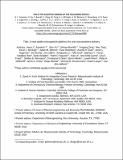A heat-stable microparticle platform for oral micronutrient delivery
Author(s)
Anselmo, Aaron C; Xu, Xian; Buerkli, Simone; Zeng, Yingying; Tang, Wen; McHugh, Kevin J; Behrens, Adam M; Rosenberg, Evan; Duan, Aranda R.; Sugarman, James L; Zhuang, Jia; Collins, Joseph; Lu, Xueguang; Graf, Tyler; Tzeng, Stephany Y; Rose, Sviatlana; Acolatse, Sarah; Nguyen, Thanh; Le, Xiao; Guerra, Ana Sofia; Freed, Lisa E; Weinstock, Shelley B.; Sears, Christopher B.; Nikolic, Boris; Wood, Lowell; Welkhoff, Philip A.; Oxley, James D.; Moretti, Diego; Zimmermann, Michael B.; Langer, Robert S; Jaklenec, Ana; ... Show more Show less
DownloadA heat-stable microparticle platform for oral micronutrient delivery.pdf (2.302Mb)
Terms of use
Metadata
Show full item recordAbstract
Micronutrient deficiencies affect up to 2 billion people and are the leading cause of cognitive and physical disorders in the developing world. Food fortification is effective in treating micronutrient deficiencies; however, its global implementation has been limited by technical challenges in maintaining micronutrient stability during cooking and storage. We hypothesized that polymer-based encapsulation could address this and facilitate micronutrient absorption. We identified poly(butylmethacrylate-co-(2-dimethylaminoethyl)methacrylate-co-methylmethacrylate) (1:2:1) (BMC) as a material with proven safety, offering stability in boiling water, rapid dissolution in gastric acid, and the ability to encapsulate distinct micronutrients. We encapsulated 11 micronutrients (iron; iodine; zinc; and vitamins A, B2, niacin, biotin, folic acid, B12, C, and D) and co-encapsulated up to 4 micronutrients. Encapsulation improved micronutrient stability against heat, light, moisture, and oxidation. Rodent studies confirmed rapid micronutrient release in the stomach and intestinal absorption. Bioavailability of iron from microparticles, compared to free iron, was lower in an initial human study. An organotypic human intestinal model revealed that increased iron loading and decreased polymer content would improve absorption. Using process development approaches capable of kilogram-scale synthesis, we increased iron loading more than 30-fold. Scaled batches tested in a follow-up human study exhibited up to 89% relative iron bioavailability compared to free iron. Collectively, these studies describe a broad approach for clinical translation of a heat-stable ingestible micronutrient delivery platform with the potential to improve micronutrient deficiency in the developing world. These approaches could potentially be applied toward clinical translation of other materials, such as natural polymers, for encapsulation and oral delivery of micronutrients.
Date issued
2019-11Department
Massachusetts Institute of Technology. Department of Biological Engineering; Koch Institute for Integrative Cancer Research at MITPublisher
American Association for the Advancement of Science (AAAS)
Citation
Anselmo, Aaron C. et al. "A heat-stable microparticle platform for oral micronutrient delivery." Science Translational Medicine 11, 518 (November 2019): eaaw3680 © 2019 The Authors
Version: Author's final manuscript
ISSN
1946-6234
1946-6242